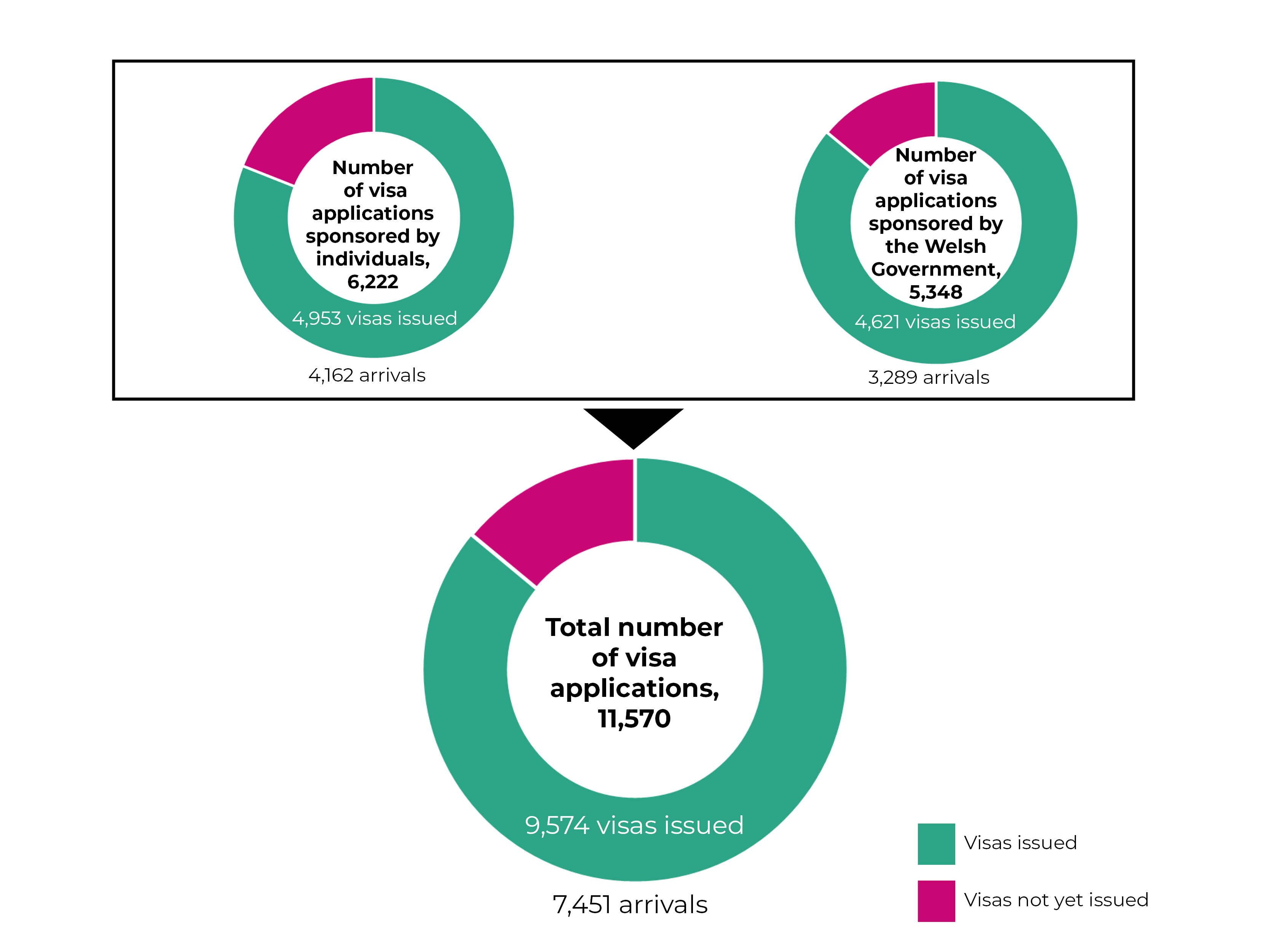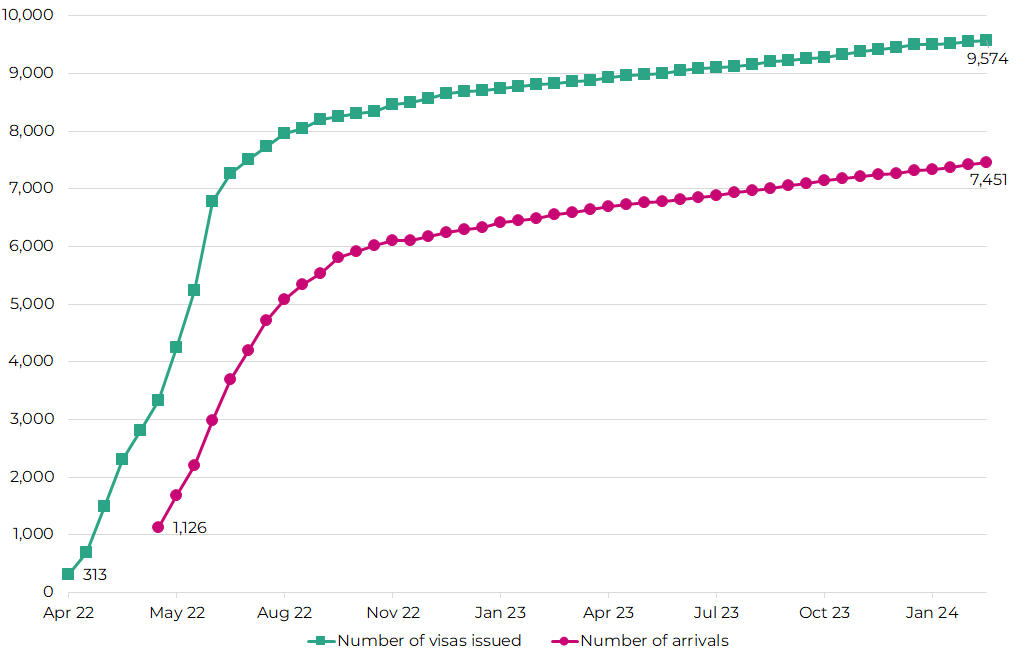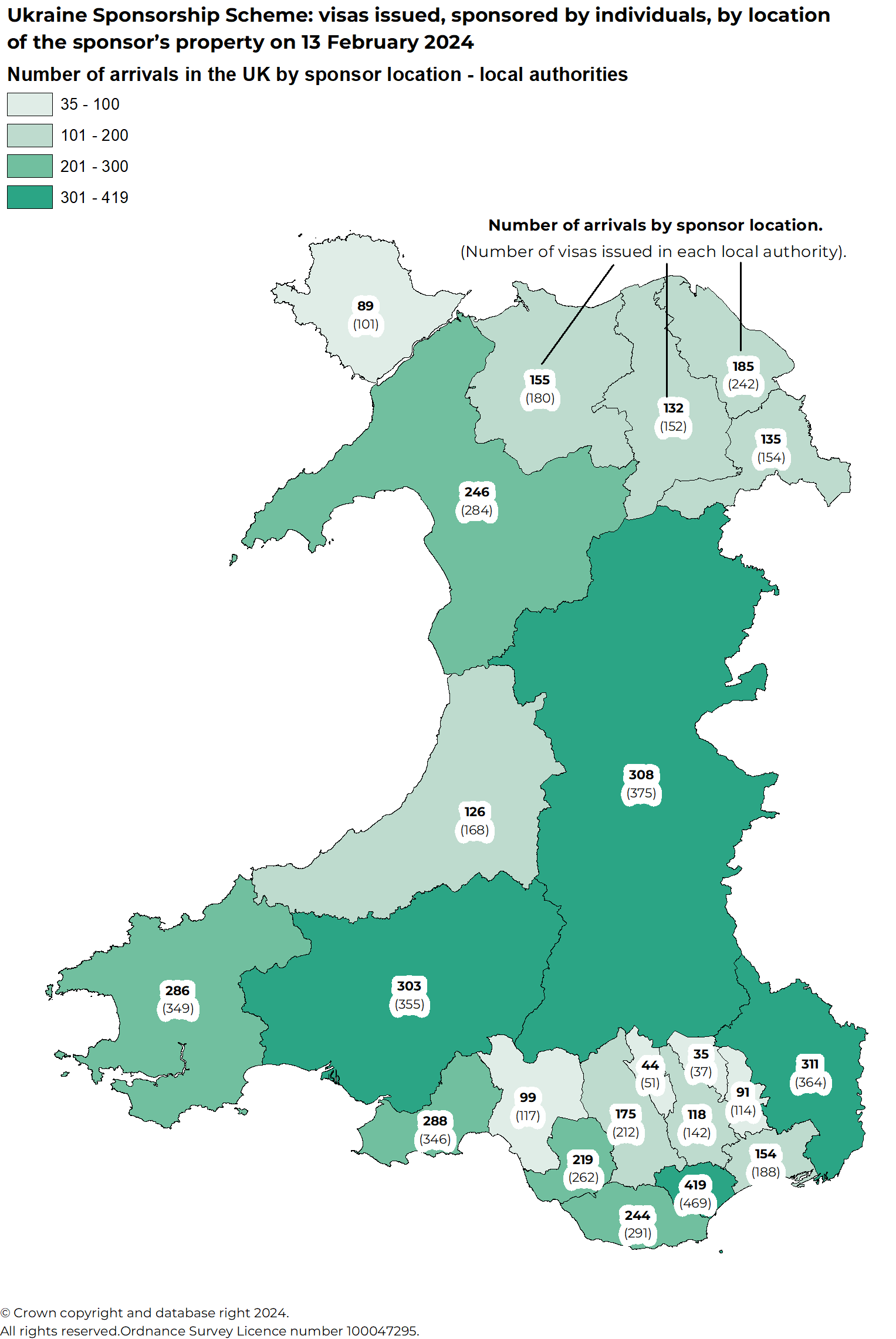The Russian invasion of Ukraine on 24 February 2022 has changed the world.
The invasion has caused massive civilian casualties and destruction of infrastructure, forcing nearly six million Ukrainians to seek safety and support across Europe.
By 13 February, almost 7,500 Ukrainians had come to Wales with the support of the UK and Welsh governments. Wales’s trade with Ukraine continues at a reduced scale after falling since the start of the invasion 725 days ago.
The anniversary will be marked in the Senedd with a statement by the Minister for Social Justice and Chief Whip, Jane Hutt MS, on 20 February and an event at the Senedd on the anniversary itself.
Our article explores what the latest statistics tell us about Ukrainian refugees in Wales and the war’s impact on trade. It follows our previous articles on the initial response, Ukrainian arrivals and the war’s early impacts.
Refugees
The fighting has escalated and the humanitarian situation in the country is dramatic and urgent. Millions have been forced to flee the war and Russian attacks, and they are in desperate need of humanitarian assistance
(The UN High Commissioner for Refugees, Filippo Grandi, 29 January 2024).
In response to Russia’s invasion, the UK Government opened three visa routes for those seeking sanctuary:
- Ukraine Extension Scheme allows Ukrainian nationals and their immediate family members to apply to stay in the UK, if they have, or previously had, permission to be in the UK.
- ‘Homes for Ukraine’ Scheme called on individuals to sponsor refugees and provide accommodation for a minimum of six months.
- Ukraine Family Scheme allows applicants to join family members who are settled in the UK or to extend their stay. This scheme has now closed to new applications.
As of 12 February 2024, just over 200,000 Ukrainian refugees had arrived in the UK via the Homes for Ukraine and Family Schemes.
Visa schemes extended
Under the visa schemes Ukrainian refugees were granted three years to remain, meaning the first visas were due to expire in March 2025. Following concerns about the “uncertainty” faced by Ukrainian refugees, on 19 February the UK Government announced the creation of a new Ukraine Permission Extension Scheme (UPE) which will provide “a new route for Ukrainians to apply for a further 18 months’ permission to stay in the UK on expiry of their current visa”. This means those on the earliest visas can stay until at least September 2026.
While extending the visa scheme, the UK Government has reduced the length of new visas issued under the Homes for Ukraine sponsorship scheme from 36 months to 18 months to “align with the period which
Nation of Sanctuary
The Welsh Government announced it would be become a Homes for Ukraine ‘super sponsor’ in March 2022. Despite a pause on new applications in June 2022, 3,289 Ukrainian refugees had arrived in Wales via this scheme by 13 February 2024 with a further 4,162 Ukrainian refugees sponsored by individuals. An additional 2,123 Ukrainians have been issued with visas allowing them to travel to Wales but are yet to arrive.
While we know how many Ukrainians have come to Wales via the schemes, we don’t know how many have since left, either to go back to Ukraine or to relocate within the UK.
Number of visa applications and visas issued through the Homes for Ukraine scheme on 13 February 2024

Number of visas issued and arrivals in Wales between 6 April 2022 and 13 February 2024

Committee highlights housing pressures
In its report on 16 March 2023, the Local Government and Housing Committee found that local authorities are under pressure to find housing for people in temporary accommodation. The Committee expressed concern that within this broader context there is insufficient accommodation available for Ukrainians to move into.
In November 2023, 11,317 individuals were in temporary accommodation in Wales but we don’t know how many of these are Ukrainian refugees. The British Red Cross has called on the Welsh Government to publish data on Ukrainian refugees experiencing homelessness.
Refugees are currently being sponsored by individuals in every Welsh local authority, as shown on the map below.

The Committee made six recommendations on key areas of concern around the sufficient provision of move-on accommodation and funding to support Ukrainian refugees. These were accepted by the Welsh Government.
Funding and budgets
The UK Government provides a monthly £350 ‘thank-you’ payment to the sponsoring Homes for Ukraine household. This increases to £500 after the first 12 months of sponsorship. The Welsh Government provides an uplift to all hosts from £350 to £500 a month during their first year of hosting.
In December 2023, the UK Government increased the period that hosts can receive the payment from 24 months to 36 months. For someone who began sponsoring a person in March 2022, this payment will now end around April 2025 instead of April 2024.
For the Welsh Government’s 2024-25 Draft Budget, the First Minister said that responding to global conflicts “remains an important part of the Welsh Government’s work”. The Draft Budget states that £15.5m will be reprioritised from the Ukraine programme due to a reduction in arrivals.
The Finance Minister has said that the Welsh Government will receive a proportionate share of a UK Government £120m Homelessness Prevention Fund that will be allocated to local authorities to assist with move-on and integration activities in support of Ukrainian refugees.
Trade with Ukraine
Since 2020, Wales exports more to Ukraine than it imports but imports have been impacted most by the war.
The value of goods traded between Wales and Ukraine dropped by 53.2% in 2022, when the war began, compared to 2021. This included a 71.5% drop in import values and a 45.3% drop in export values.
The latest statistics, to the year ending September 2023, show a drop in total value of goods traded of 16.6% compared with the previous period, to £14.1 million. This includes a 46.1% drop in import values to £2.5 million and a 5.7% drop in export values to £11.7 million.
As part of its scrutiny of international agreements, the Economy, Trade and Rural Affairs Committee wrote to the Welsh Government to ask its views on changes to the UK-Ukraine trade deal to support Ukraine. The Minister for Economy, Vaughan Gething MS, replied:
We are fully supportive of any measures to support Ukraine in the ongoing conflict and welcome the positive actions the UK government have taken.
Conclusion
At the Senedd, Ukraine is never far away. Members frequently highlight its wide-ranging impacts – from allegations of war crimes and concerns about food security to the need to enhance digital regulation to tackle misinformation .
The information presented in this article also demonstrates how the conflict continues to relate directly to Wales.
The Minister’s statement tomorrow will mark 726 days of war in Europe, as the reality of a long-term conflict for the people of Ukraine and the world takes hold.
Article by Sara Moran and Claire Thomas, Senedd Research, Welsh Parliament






